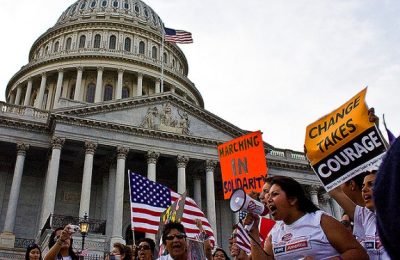Immigration Reform
The last time Congress updated our legal immigration system was November 1990, one month before the World Wide Web went online. We are long overdue for comprehensive immigration reform.
Through immigration reform, we can provide noncitizens with a system of justice that provides due process of law and a meaningful opportunity to be heard. Because it can be a contentious and wide-ranging issue, we aim to provide advocates with facts and work to move bipartisan solutions forward. Read more about topics like legalization for undocumented immigrants and border security below.
Making E-Verify Mandatory Will Not Magically Solve Our Immigration Woes
Here we go again with the next round of “how we’re going to look tough on immigration without actually accomplishing anything.” This year, mandatory E-Verify is the magic bullet of choice. On Tuesday, House Judiciary Committee Chairman Lamar Smith (R-TX) introduced the “Legal Workforce Act,” which would expand the E-Verify program, making it mandatory for all employers in the United States. A hearing on the bill was held today in the Immigration Policy and Enforcement Subcommittee. Read More

Immigration Tops Economy as Most Important Issue for Latino Voters
According to a poll released yesterday, “U.S. immigration policy” beat out “economy and jobs” as the issue most important for Hispanic voters. The poll, conducted by independent research firm Latino Decisions, asked 500 registered Hispanic voters to name the most important issues facing Hispanics. 51% of respondents said “immigration;” 35% said “economy and jobs;” and 15% said “education.” Pollsters suggest voters’ “direct and personal connection with the problems of the undocumented” as a reason immigration topped the economy—personal relationships that even “affect the political choices of a second or third generation of Latinos born here.” With reform efforts stalled in Congress, many are wondering what kind of political choices Hispanic voters will make in the upcoming 2012 election cycle. Read More

Immigration Tops Economy as Most Important Issue for Latino Voters
According to a poll released yesterday, “U.S. immigration policy” beat out “economy and jobs” as the issue most important for Hispanic voters. The poll, conducted by independent research firm Latino Decisions, asked 500 registered Hispanic voters to name the most important issues facing Hispanics. 51% of respondents said “immigration;” 35% said “economy and jobs;” and 15% said “education.” Pollsters suggest voters’ “direct and personal connection with the problems of the undocumented” as a reason immigration topped the economy—personal relationships that even “affect the political choices of a second or third generation of Latinos born here.” With reform efforts stalled in Congress, many are wondering what kind of political choices Hispanic voters will make in the upcoming 2012 election cycle. Read More

Once Again, Congress Pursues Costly E-Verify Legislation to the Peril of U.S. Economy
Washington D.C. – On Wednesday, the House Judiciary Subcommittee on Immigration Policy and Enforcement will hold a hearing on the “Legal Workforce Act,” another enforcement-only bill introduced today by Judiciary Chairman Lamar Smith (R-TX). The bill would make the electronic employment verification system “E-Verify” mandatory for all employers within two… Read More

Pending a Resolution of DOMA, Immigration Judges Should Exercise Discretion to Stay Removal Cases
BY BETH WERLIN AND VICTORIA NEILSON To date, five states plus the District of Columbia celebrate marriages of gay and lesbian couples and several other states honor such marriages. In addition, five countries, including Canada, permit marriages of gay and lesbian couples and at least fourteen additional countries recognize same-sex relationships for immigration purposes. Yet, because the U.S. immigration agencies rely on section 3 of the Defense of Marriage Act (DOMA)—defining marriage as a union between one man and one woman—lesbian and gay U.S. citizens and lawful permanent residents are barred from obtaining immigrant visas for their spouses, visas that are available to heterosexual U.S. citizens and residents with foreign-born spouses. Gay and lesbian noncitizens also are precluded from obtaining other immigration protections, including relief from removal, based on a marriage to a U.S. citizen or permanent resident. As a result, families are separated and spouses of U.S. citizens and lawful permanent residents are deported from the United States. Read More

Pending a Resolution of DOMA, Immigration Judges Should Exercise Discretion to Stay Removal Cases
BY BETH WERLIN AND VICTORIA NEILSON To date, five states plus the District of Columbia celebrate marriages of gay and lesbian couples and several other states honor such marriages. In addition, five countries, including Canada, permit marriages of gay and lesbian couples and at least fourteen additional countries recognize same-sex relationships for immigration purposes. Yet, because the U.S. immigration agencies rely on section 3 of the Defense of Marriage Act (DOMA)—defining marriage as a union between one man and one woman—lesbian and gay U.S. citizens and lawful permanent residents are barred from obtaining immigrant visas for their spouses, visas that are available to heterosexual U.S. citizens and residents with foreign-born spouses. Gay and lesbian noncitizens also are precluded from obtaining other immigration protections, including relief from removal, based on a marriage to a U.S. citizen or permanent resident. As a result, families are separated and spouses of U.S. citizens and lawful permanent residents are deported from the United States. Read More

Alabama Governor Signs Costly Immigration Bill, ACLU to File Suit
Yesterday, Alabama Governor Robert Bentley signed a restrictive immigration bill (HB 56) into law, making Alabama the fourth state to sign “get tough” Arizona-style immigration legislation. Among the restrictive provisions, HB 56 requires local law enforcement, in some instances, to verify the immigration status of those stopped for traffic violations, public schools to determine the immigration status of students, employers to use E-Verify and makes it a crime to knowingly rent to, transport or harbor undocumented immigrants. Although Gov. Bentley touts the law as the nation’s toughest, he might also consider mounting a similarly tough legal defense as civil rights groups have declared their intention to file suit. Read More

More Immigrants are Educated, Skilled Than Ever Before, Report Finds
A new report released by the Brookings Institution dispels the myth that all immigrants are unskilled, uneducated, and illegal. The report, entitled The Geography of Immigrant Skills: Educational Profiles of Metropolitan Areas, finds that the share of working-age immigrants in the United States who have at least a bachelor’s degree is greater than the share who lack a high-school diploma. Moreover, immigrants with college degrees outnumber immigrants without high-school diplomas by wide margins in more than two-fifths of the nation’s 100 largest metropolitan areas. Read More
Make a contribution
Make a direct impact on the lives of immigrants.
